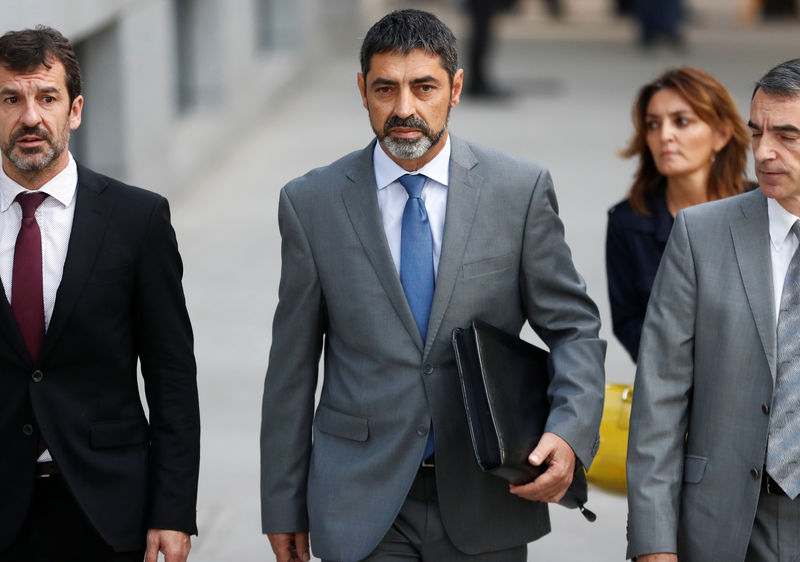 © Reuters. Josep Lluis Trapero, the head of the Mossos d’Esquadra, the Catalan regional police force, enters the High Court to testify for the alleged crime of sedition in Madrid
© Reuters. Josep Lluis Trapero, the head of the Mossos d’Esquadra, the Catalan regional police force, enters the High Court to testify for the alleged crime of sedition in Madrid2/2
By Julien Toyer and Sam Edwards
MADRID/BARCELONA (Reuters) – Catalan authorities must drop a bid for independence by Thursday, the Spanish government said, moving closer to imposing direct rule over the region after its leader missed an initial deadline to back down.
In a confrontation viewed with a mounting sense of unease in European capitals and markets, Carles Puigdemont failed on Monday to respond to an ultimatum from Madrid to clarify if he had declared independence.
Plunging Spain into its worst political crisis since an attempted military coup in 1981, Catalan voters backed a breakaway in a referendum on Oct. 1 that Spain’s Constitutional Court said was illegal.
On that basis, Puigdemont made a symbolic declaration of independence last Tuesday, but immediately suspended it and called for negotiations with Madrid on the region’s future.
Madrid had given him until 10:00 a.m. (0800 GMT) to clarify his position on independence with a “Yes” or “No”, and until Thursday to change his mind if he insisted on a split – saying it would suspend Catalonia’s autonomy if he chose secession.
Deputy Prime Minister Soraya Saenz de Santamaria said after the deadline passed that he had not answered the question and had to do so by Thursday.
“Mr Puigdemont still has the opportunity to start resolving this situation, he must answer ‘yes’ or ‘no’ to the declaration,” Saenz de Santamaria said.
In a letter to Spanish Prime Minister Mariano Rajoy made public on Monday, Puigdemont did not directly answer on the independence issue, instead making a “sincere and honest” offer for dialogue between the two men over the next two months.
In reply, Rajoy said Puigdemont’s stance had brought Madrid closer to triggering Article 155 of the constitution, under which it can impose direct rule on any of the country’s 17 autonomous communities if they break the law.
Suggesting Puigdemont and his team remained in no mood to follow Rajoy’s game plan, Catalan interior chief Joaquim Forn said Article 155 did not allow Madrid to remove members of the Catalan government.
BROADER SECESSIONIST CONCERNS?
The Catalan government says 90 percent of voters in the referendum backed a breakaway, but turnout was only 43 percent as most opponents of independence in the region boycotted it.
While that points to a lukewarm endorsement of Puigdemont’s intentions, EU authorities remain concerned that the deepening impasse between Madrid and Barcelona may impel moves towards secession elsewhere in the bloc.
European Commission President Jean Claude Juncker last week said Catalan independence would encourage other regions to follow suit, potentially making the European Union ungovernable, while investors believe a split could curb and eventually derail an economic rebound.
Spanish bonds and stocks sold off on Monday, sweeping away calm generated last week by soothing messages on stimulus from the ECB. [L8N1MR0XO]
The terms of Article 155 on direct rule, which has never been applied, are vague.
It says that when a region does not meet its constitutional obligations or other laws, or goes against the general interest, the government “can adopt any measure needed to force those obligations to be met” once receiving approval from Spain’s lower house.
The article’s wording suggests that would include anything from taking control of the regional police and finances to installing a new governing team or calling a snap election.
Catalan police chief Josep Lluis Trapero appeared before Spain’s High Court on Monday to be questioned over whether his force, the Mossos d’Esquadra, deliberately failed to enforce the court ban on the independence referendum.
Trapero has been put under formal investigation for sedition after failing to order to rescue Civil Guard police who were trapped inside a Catalan government building in Barcelona by tens of thousands of pro-independence protesters.
The heads of civic groups Asamblea Nacional Catalana and Omnium will also testify over their role in organising those protests.
Source: Investing.com



























